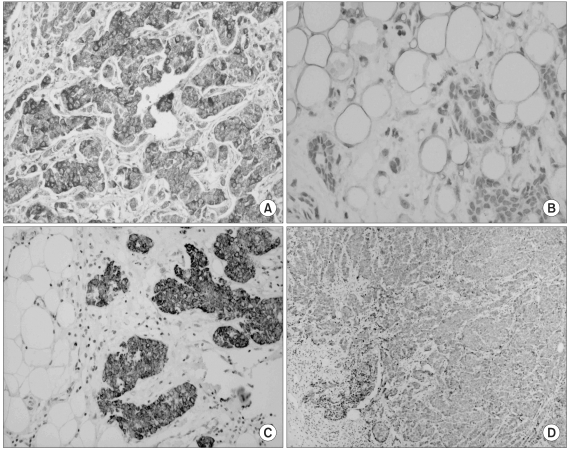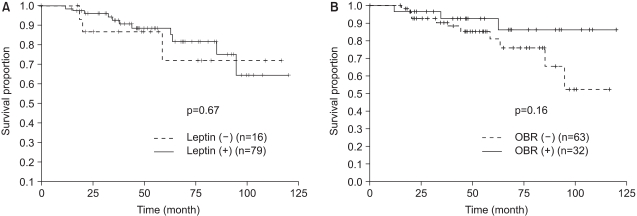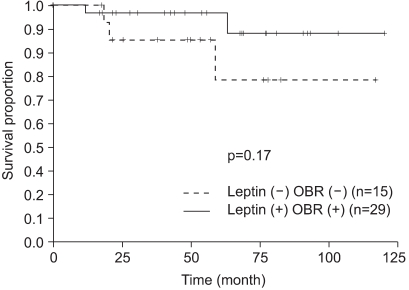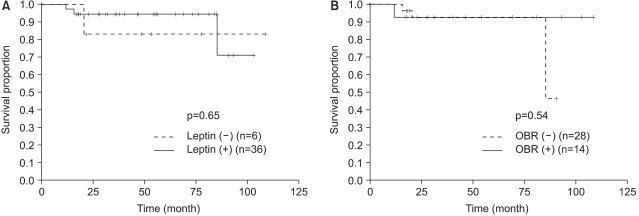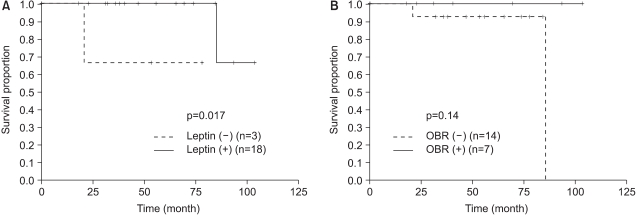Cancer Res Treat.
2006 Jun;38(3):126-132.
Effects of the Expression of Leptin and Leptin Receptor (OBR) on the Prognosis of Early-stage Breast Cancers
- Affiliations
-
- 1Division of Hemato-Oncology, Department of Medicine, Kyung Hee University College of Medicine, Seoul, Korea. sykim55@chol.com
- 2Department of Pathology, Kyung Hee University College of Medicine, Seoul, Korea.
- 3Department of General Surgery, Kyung Hee University College of Medicine, Seoul, Korea.
Abstract
-
PURPOSE: Obesity-related leptin and leptin receptor (OBR) have a relation to the development of cancer and metastasis and also the low survival rate for breast cancer patients. Leptin has been associated with increased aromatase activity and it displays functional cross-talk with estrogen. This study was designed to determine the relationship between the expression of leptin and OBR in breast cancer tissue and the prognosis of early-stage breast cancer patients, and especially for the tamoxifen-treated patients.
MATERIALS AND METHODS
Ninety-five patients with early-stage breast cancer and who had undergone surgical treatment at Kyung Hee University Hospital between January 1994 and June 2004 were analyzed. The surgical specimens underwent immunohistochemical analysis for leptin and OBR. The patients' survival and clinical characteristics were obtained from the medical records.
RESULTS
Of the 95 patients, 79 (83%) and 32 (33.7%) showed the expression of leptin and OBR in breast cancer tissue, respectively. The expression of leptin and OBR in breast cancer tissue was not significantly related to the clinicopathological characteristics, including obesity, the expression of hormonal receptor, the HER-2/neu expression, menopause, stage and the nuclear grade. The expression of leptin and OBR was not significantly related to the overall disease-free survival (DFS). For the tamoxifen-treated postmenopausal obese patients, the DFS of the leptin-positive group was higher than that of the leptin-negative group (p=0.017).
CONCLUSION
The expression of leptin and OBR in breast cancer tissue may be not a prognostic factor for disease-free survival of breast cancer patients. In the future, further studies are needed to determine whether leptin expression could be a predictive factor for tamoxifen therapy in the postmenopausal obese subgroup among the early breast cancer patients.
Keyword
MeSH Terms
Figure
Reference
-
1. Cleary MP, Maihle NJ. The role of body mass index in the relative risk of developing premenopausal versus postmenopausal breast cancer. Proc Soc Exp Biol Med. 1997; 216:28–43. PMID: 9316608.
Article2. Edman CD, Aiman EJ, Porter JC, MacDonald PC. Identifi cation of the estrogen product of extraglandular aromatization of plasma androstenedione. Am J Obstet Gynecol. 1978; 130:439–447. PMID: 629288.3. Catalano S, Marsico S, Giordano C, Mauro L, Rizza P, Panno ML, et al. Leptin enhances, via AP-1, expression of aromatase in the MCF-7 cell line. J Biol Chem. 2003; 278:28668–28676. PMID: 12734209.
Article4. Bunone G, Briand PA, Miksicek RJ, Picard D. Activation of the unliganded estrogen receptor by EGF involves the MAP kinase pathway and direct phosphorylation. EMBO J. 1996; 15:2174–2183. PMID: 8641283.
Article5. Shimizu H, Shimomura Y, Nakanishi Y, Futawatari T, Ohtani K, Sato N, et al. Estrogen increases in vivo leptin production in rats and human subjects. J Endocrinol. 1997; 154:285–292. PMID: 9291839.
Article6. O'Brien SN, Welter BH, Price TM. Presence of leptin in breast cell lines and breast tumors. Biochem Biophys Res Commun. 1999; 259:695–698. PMID: 10364481.7. Ishikawa M, Kitayama J, Nagawa H. Enhanced expression of leptin and leptin receptor (OB-R) in human breast cancer. Clin Cancer Res. 2004; 10:4325–4331. PMID: 15240518.
Article8. Garofalo C, Koda M, Cascio S, Sulkowska M, Kanczuga-Koda L, Golaszewska J, et al. Increased expression of leptin and the leptin receptor as a marker of breast cancer progression: possible role of obesity-related stimuli. Clin Cancer Res. 2006; 12:1447–1453. PMID: 16533767.
Article9. Savouret JF, Rauch M, Redeuilh G, Sar S, Chauchereau A, Woodruff K, et al. Interplay between estrogens, progestins, retinoic acid and AP-1 on a single regulatory site in the progesterone receptor gene. J Biol Chem. 1994; 269:28955–28962. PMID: 7961858.
Article10. Singletary SE, Allred C, Ashley P, Bassett LW, Berry D, Bland KI, et al. Revision of the American Joint Committee on Cancer staging system for breast cancer. J Clin Oncol. 2002; 20:3628–3636. PMID: 12202663.
Article11. Bloom HJ, Richardson WW. Histological grading and prognosis in breast cancer. A study of 1049 cases of which 359 have been followed for 15 years. Br J Cancer. 1957; 11:359–377. PMID: 13499785.12. Tessitore L, Vizio B, Jenkins O, De Stefano I, Ritossa C, Argiles JM, et al. Leptin expression in colorectal and breast cancer patients. Int J Mol Med. 2000; 5:421–426. PMID: 10719061.
Article13. Mantzoros CS, Bolhke K, Moschs S, Cramer DW. Leptin in relation to carcinoma in situ of the breast: a study of premenopausal cases and controls. Int J Cancer. 1999; 80:523–526. PMID: 9935151.
- Full Text Links
- Actions
-
Cited
- CITED
-
- Close
- Share
- Similar articles
-
- Expression of Leptin, Leptin Receptor, Adiponectin, and Adiponectin Receptor in Ductal Carcinoma In Situ and Invasive Breast Cancer
- Leptin and Leptin Receptor Expression in Breast Cancer
- Signaling Role of Adipocyte Leptin in Prostate Cell Proliferation Induced by Trichomonas vaginalis
- Identification and cDNA Cloning of the Leptin Receptor Long from ( OB-Rb ) from Rat Splenocytes
- Association of plasma adiponectin and leptin levels with the development and progression of ovarian cancer

